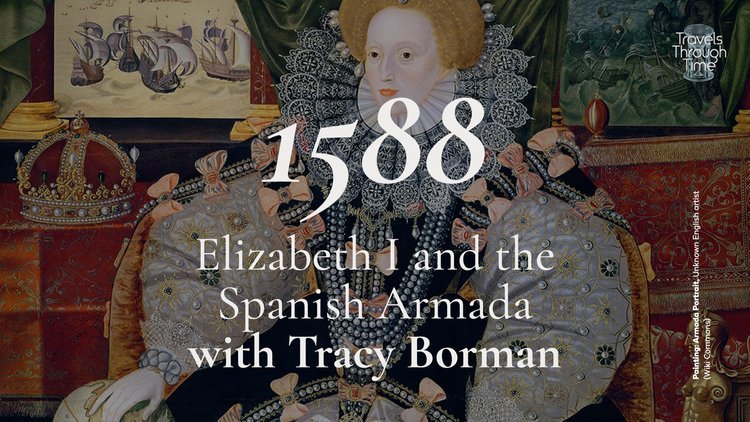Elizabeth Stuart, Queen of Hearts: Nadine Akkerman (1620)
Nadine Akkerman, author of Elizabeth Stuart, Queen of Hearts
In Women’s History Month we take a look back at a figure who has been misrepresented by successive generations of historians. Elizabeth Stuart was the goddaughter of Queen Elizabeth I and sister of the ill-starred King Charles I of England. She was someone who played an active and fascinating part in the times in which she lived.
In this episode the Dutch historian Nadine Akkerman takes us back to meet a woman who was known as ‘The Queen of Hearts.’
*** [About our format] ***
Since the 1980s, there has been a concerted effort to recover and reassess the role played by women in the past, as historians strive to tell their stories objectively and in more detail.
This is very much the aim of today’s guest, Nadine Akkerman, a Dutch academic who has spent the last two decades trawling archives across Europe with the aim of bringing together the correspondence of an extraordinary woman, Elizabeth Stuart, Princess of England and Scotland, Electress of the Palatinate and briefly Queen of Bohemia.
Elizabeth was the daughter of James I and sister of the ill-fated Charles, and while plenty has been written about her over the centuries since her death in 1662, much of it is coloured by bias, inaccuracy, and rumour.
Read an exlusive extract from ‘Elizabeth Stuart’ at Unseen Histories.
In her riveting new book, Elizabeth Stuart, Queen of Hearts, Nadine Akkerman draws back the curtain on centuries of hearsay and prejudice to reveal Elizabeth’s life in its full, extraordinary glory. This was a woman of great courage and intelligence, who ruled alongside her husband, guided their children after his death, played a vital role in contemporary politics, travelled extensively, wrote letters voraciously and hunted wild boar while eight months’ pregnant.
Who knows how the seventeenth century would have turned out if she had acceded to the throne of England in 1625 instead of her hapless brother Charles I. She was, in so many ways, the true successor of her namesake and godmother, Queen Elizabeth I.
*
This episode is supported by Oxford University Press. Click here to find out more about their excellent and wide-ranging catalogue of history books.
*** Listen to the Podcast ***
Show Notes
Scene One: Elizabeth all alone in Prague, refusing to abandon her subjects, while her husband is with the army.
Scene Two: The lunch before the battle of White Mountain. Her husband is in Prague and Elizabeth wants to visit the troops. They realize they are too late – battle has already begun.
Scene Three: Heavily pregnant, Elizabeth flees from Prague in search of a safe haven where she can give birth.
Memento: Elizabeth’s ‘pacquet de nuit’; the one item the enemy (i.e. the Duke of Bavaria) managed to take from her during the flight. Ambassadors later try to get it back, so it must have been important to her. Previous biographers have translated it as ‘nightclothes’. I can’t imagine that to be correct, but I don’t know what it is either!
People/Social
Presenter: Violet Moller
Guest: Nadine Akkerman
Production: Maria Nolan
Podcast partner: Unseen Histories
Follow us on Twitter: @tttpodcast_
Or on Facebook
See where 1620 fits on our Timeline
About Nadine Akkerman
Nadine Akkerman is Reader in early modern English Literature at Leiden University and author of the critically acclaimed Invisible Agents: Women and Espionage in Seventeenth-Century Britain and The Correspondence of Elizabeth Stuart, Queen of Bohemia.
She is a member of The Young Academy of the Royal Netherlands Academy of Arts and Sciences, and has received several awards including a Special Recognition Award from the World Cultural Council, and an Ammodo Science Prize for fundamental research in the humanities.
Seventeenth-century Prague
[Credit: LOC}
Featured Images
Listen on YouTube
Complementary Episodes
Elizabeth I and the Spanish Armada: Tracy Borman (1588)
Bestselling historian and novelist Tracy Borman takes us back to the tense summer of 1588. While various events compete for attention – the fate of the Armada, the health of Leicester – Elizabeth remains at the heart of it all.
Eleanor of Aquitaine, The Matriarch: Sara Cockerill (1199)
Eleanor of Aquitaine was one of the remarkable figures of the High Middle Ages. She was a queen of France and England and a mother to two kings. It is in this latter role of family matriarch that we view Eleanor in this episode.
An Execution and a Witch: Malcolm Gaskill (1649)
In this episode Malcolm Gaskill takes us on a tour of 1649 to see the death of a king, the birth of a movement and an accusation of witchcraft.















